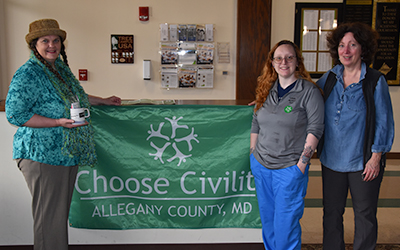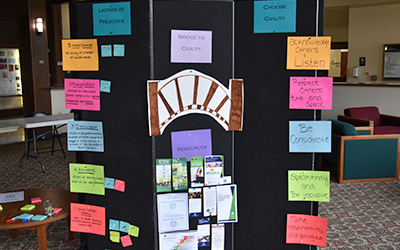FOR IMMEDIATE RELEASE
FOR MORE INFORMATION
Shauna McQuade 301-784-5154
ACM Joins with Leading Higher Education Organizations to Engage All College Students
in Civic Learning and Democracy Engagement
CUMBERLAND, Md. (Aug. 23, 2022) - Allegany College of Maryland has joined forces with
dozens of higher education and student success organizations to announce a “Shared
Commitment” to make “Democracy Learning a Top Priority for Postsecondary Education.”
Democracy faces monumental challenges in the U.S. and world-wide. And in this pivotal
era, “Shared Commitment’ calls on the higher education community to take concerted
action to help build Americans’ readiness to tackle urgent public problems, together.
Urging “equity-committed civic learning,” the “Shared Commitment” signatories call
for civic inquiry, practice in civil discourse, and collaborative work on real-world
public problems to be part of each postsecondary student’s educational pathway.
“Allegany College of Maryland prides itself in being recognized as one of the nation’s
democracy school. ACM was one of the 26 original signatory community colleges in
the Democracy Project, that recognized the important role community colleges have
in creating an informed citizenry for the health of our democracy. At ACM, we pride
ourselves in providing opportunities for our students to engage with numerous local
partners in order to address issues in our community. Students develop a greater
understanding of the community and of people who may be different from them. What
results is that students feel a greater sense of civic attitudes and civic behaviors,
that often is transformative,” said Dr. Kurt Hoffman, Senior Vice-President of Instructional
and Student Affairs.
The Shared Commitment pledge was organized by the Civic Learning and Democracy Engagement
coalition (CLDE). The Coalition is led by the Association of American Colleges and Universities (AAC&U), Campus Compact, the State Higher Education Executive Officers Association (SHEEO), Complete College America (CCA) and College Promise. The CLDE coalition is working in partnership with civic learning organizations and
initiatives across the U.S.
CLDE builds from the revival of civic learning already spreading across K-12 and hundreds
of postsecondary institutions, spurred by the work of many educational organizations
that endorsed the Shared Commitment statement.
“These efforts are a strong beginning, but much more is needed to make democracy learning
expected, rather than possible, for postsecondary students,” say CLDE leaders.
The problem, say CLDE leaders, is that students from underserved communities are often
the least likely to take part in programs and courses that help engage them with urgent
public problems. In response, CLDE is making “equitable participation by students
from underserved communities a top priority.”
CLDE seeks to expand the national debate from its insufficient focus on skills and
short-term training to a larger concern with all college students’ civic, historical,
global, and intercultural knowledge, and students’ active work on pressing public
problems.
“Shared Commitment” signatories include the Higher Learning Commission which, in 2020,
made civic engagement a criterion for the 967 institutions it accredits. Six of the
major institutional accreditation associations also signed the statement. Three signatory
state systems recently launched comprehensive initiatives to advance civic learning
for all students in their public community colleges and universities.
Other CLDE partners are working in private higher education, in public and private
consortia, and in active and ongoing partnerships between universities and community-based
organizations, local governments, and philanthropies.
The CLDE coalition will work with its partners on four goals to engage college students
with democracy’s future:
- Quality and Equity: Build commitment and capacity—across postsecondary education—to
make civic learning and democracy engagement an expected part of a quality college
education for all college students, with equitable participation by students from
underserved communities a top priority.
- Democracy Engagement: Engage students with democracy’s history, present and future
in a diverse United States, in U.S. communities still struggling to reverse inherited
disparities, and in a globally interdependent world where authoritarianism is on the
rise.
- Collaborative Problem-Solving: Prepare each postsecondary student, through creative
combinations of general education, arts and sciences studies, and career-related studies,
to work directly on selected public problems that society needs to solve—e.g., problems
in racial healing, health, education, housing, climate, digital access, human rights,
justice systems, interfaith cooperation, and more.
- Policy Commitment: Secure policy support for and robust public investment in the goals
listed above.
To learn more about Allegany College of Maryland’s efforts on civic learning and democracy
engagement, visit https://www.allegany.edu/college-to-community-partnership-center/index.html.
Additional information on civic learning also available at: www.CollegeCivicLearning.org







